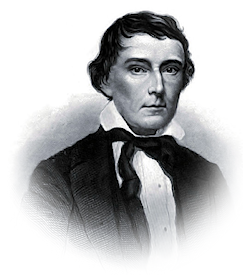Crawfordville [Ga.], Aug. 8th, 1860.
Dear Smith, Yours of the 1st inst. was received some days ago but I have not been in much condition to write with much ease to myself since. About ten or twelve days ago I got a fall as I was going out of the door which gave me some ugly looking bruises on the chin, nose, lips and face generally. Besides this my wrists and both hands suffered. I have not been able to use them well since. The thumb on the pen hand is still out of order. It is with difficulty I write. The accident happened by the heel of my shoe catching or rather heavily touching the carpet strip at the door which gave me a [illegible]. The balance being lost I fell head and face foremost down the steps to the ground, near eight feet, the face striking the hard gravelled ground. It is a wonder the injuries were not more serious than they were. It was truly a frightful fall. But enough of this. I was very sorry indeed to hear of your interview with Mr. Cobb. Sorry to see the vindictive spirit of persecution which the Administration seems determined to carry out. For your own sake I hope nothing further will be done in the matter. Any thing that I could do for you in bringing you in communication with the Constitutionalist or any other papers as a correspondent will be most cheerfully done. I look upon the election of Douglas as hopeless; yet it is important that the truth should be vindicated before the people. It is not my intention to take very active part in the canvass or ever in any political canvass again. This I have told you before. When I quit Congress I quit politicks, particularly its strifes on the hustings, forever. My dislike for that sort of business was one of my reasons for going into retirement.
Linton’s resignation of his seat upon the Supreme Court bench [of Georgia] was not with any view of entering into politicks. Far from it. He looks upon such struggles with even greater aversion, I believe, than I do. His object was to go like myself into perfect retirement where he can pursue such objects as are more agreeable to his feelings and tastes than the wranglings of a multitude can afford, either on the “stump” or in the forum. His fondness for books will afford him ample sources for entertainment and amusement. The country at present I think presents nothing attractive to the mind of a patriot. Everything it seems to me is tending, or rather rapidly rushing to national disruption and general anarchy. There is not political virtue enough in the land to save it. This is my present conviction ; and while I may still hope, for one may hope as long as life lasts, yet I am fully prepared in mind at least for the greatest and worst calamities that can befal a people. Write often.
From Annual Report of the American Historical Association for the Year 1911.
Alexander Hamilton Stephens was an American politician who served as the vice president of the Confederate States from 1861 to 1865. After serving in both houses of the Georgia General Assembly, he won election to Congress, taking his seat in 1843. After the Civil War, he returned to Congress in 1873, serving to 1882 when he was elected as the 50th Governor of Georgia, serving there from late 1882 until his death in 1883.
J. Henley Smith was a Georgia journalist.
